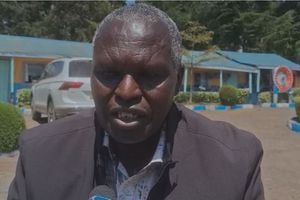Where coronavirus is a death sentence

What you need to know:
- Six months into the pandemic, 17 counties do not have ICU beds to cater for Covid-19 patients who fall critically ill.
Seventeen counties still do not have intensive care unit beds for Covid-19 patients, almost six months into the pandemic.
This is according to a report presented to the Senate Ad-hoc Committee on Covid-19 by Health Chief Administrative Secretary Mercy Mwangagi.
According to the document, there are only 7,411 isolation beds and 312 ICU beds in the country.
The 17 counties with no ICU beds include Baringo, Bomet, Busia, Homa Bay, Kirinyaga, Lamu, Marsabit, Meru, Migori, Nandi, Nyeri, Samburu, Siaya, Taita Taveta, Tana River, Uasin Gishu and West Pokot.
More worrying is that out of the 11 counties that are considered to be hotspots for the virus, five lack ICU beds, which means patients who fall critically ill in these counties are likely to die.
The five counties with no dedicated ICU beds for Covid-19 patients are Busia, Migori, Uasin Gishu, Nyeri and Lamu.
“The total ICU bed capacity so far assessed across 45 counties is 312 ICU beds, this is short of the MoU’s recommendation of five to six per cent of isolation beds. Out of 7,411 isolation beds the ICU beds should be 371 beds, revealing a gap of approximately 58 beds,” the report reveals.
A total of 21,263 cases have been reported in the 11 counties that have 3,050 isolation beds and 131 ICU Beds.

The Health ministry revealed that the current bed capacity in the 11 hotspot counties would be stretched if 10 to15 per cent of the Covid-19 cases needed admission for treatment.
It further indicated that going by the current case numbers in Nairobi, which is the epicentre of the virus, the bed capacity would be inadequate to meet escalated cases.
Covid-19 epicentre
“Out of 1,109 beds in Nairobi, which is the epicentre of Covid-19, the primary bed supply is from the government and private health facilities (1,081 beds), contributing over 95 per cent of the bed count for the county,” the report states.
Others include Machakos with seven ICU beds, Kilifi (7), Kakamega (6), Garissa (4) and Makueni that has only two ICU beds.
Nairobi, which has the highest number of Covid-19 positive cases, has the highest number ICU beds at 75, followed by Mombasa (16), Mandera (16), Tharaka Nithi (15), Kisii (15) and Embu (14).
A key finding from the assessment reveals that Nairobi is relying heavily on government and private facilities to handle the Covid-19 patients due to the poor state of Nairobi Metropolitan Services’ public health facilities.
“This may present a challenge for the general public to access affordable Covid-19 treatment,” the ministry noted.

In the counties, although the health infrastructure is primarily county owned, several counties have leveraged private public partnerships with faith-based, NGO and other partners for example, Turkana, Bomet, Murang’a, Nyandarua, Meru, Tharaka Nithi, and Mombasa counties.
Out of 263 facilities visited by officials from the Health ministry, 64 per cent were level four and above, which comprise of specialised facilities selected to handle Covid-19 isolation cases.
The facilities were assessed for adherence to ministry guidelines and 45 per cent fell in the average category, reflecting high levels of functional infrastructure, service capacity and capabilities in line with MOH standards.
Technical challenges
The report noted that counties still have persistent technical challenges in health infrastructure and facility.
The report indicates that several counties have ongoing construction works to increase their health infrastructure to meet the minimum requirements.






